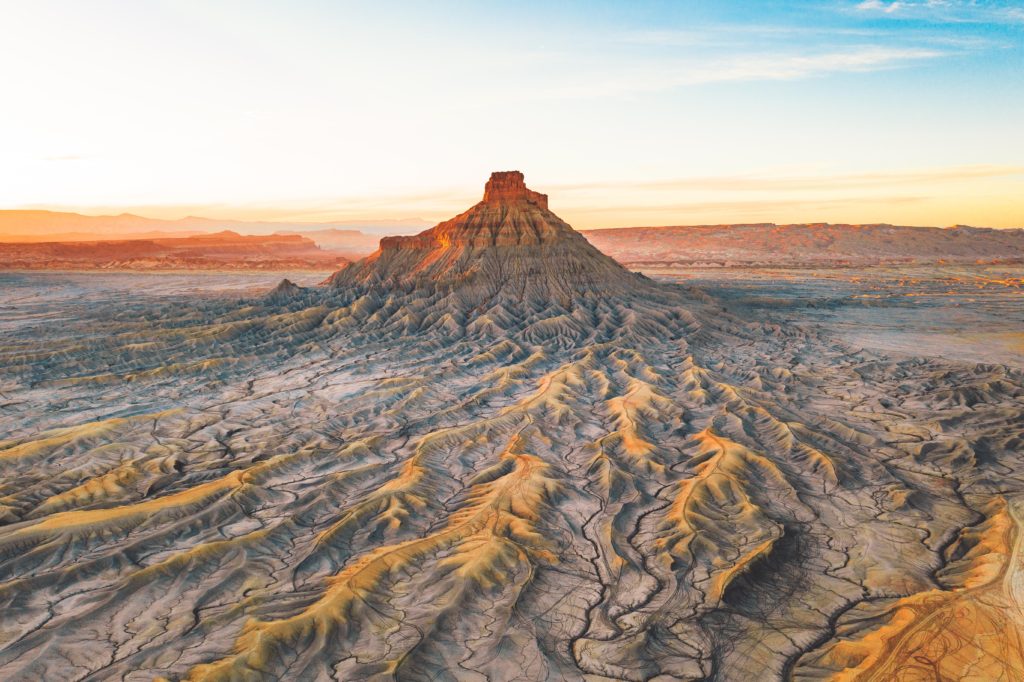The Daily Escape:

Sunset, Factory Butte, UT – photo by goat_chop56
Blog reader David K. emailed:
“Now, what do we common folk do? Start our “victory gardens” and shelter in place? Volunteer to help our local farmers raise food? Hoard? Wish I had a great idea, because I agree that our leaders don’t have a clue how to respond.”
That gave Wrongo pause. What do those of us who aren’t part of the “smart money” crowd supposed to do, particularly if what we’re facing is a worldwide depression? John Pavlovitz frames the existential issues quite clearly:
What happens if the stores run out of essentials for good?
What if you run out of money to stockpile them?
What if your neighbors stop sharing with you?
What if the government won’t help you?
What might you do then?
Politicians say we’re at war, but as Kunstler says: “At least in wartime, the bars stay open. That’s how you know this is a different thing altogether from whatever else you’ve seen in your lifetime.”
We’re attacked by a novel virus that’s created a completely novel social and economic situation. By definition, we aren’t prepared for an abrupt crash of both our social fabric, and our economic well-being.
Our politicians have no answers, despite most of them having been around for the 2007-2008 Great Recession. The Fed hasn’t done us any favors since then, either.
Last Saturday, Wrongo said that we’re crossing a threshold between what we know and an unseen future. Our traditional systems are no longer capable of keeping society and the economy on an even keel. Nobody really knows how deep and how harsh this will get, but the situation presents two questions:
- How much disorder will we have to endure?
- What does the world look like when this thing is over?
All this is happening in an election year, when the entire government and the political parties’ power structures are vulnerable, and could change. We are facing a new reality, for which no one has any answers.
Politics being what it is, the White House and the Congress are trying to work together to come up with solutions. On Monday, Trump gave another press conference on COVID-19. During his talk, the stock market dropped nearly 3,000 points. It was the market’s worst day since Black Monday in 1987.
The smart money was behind Trump in order to get its corporate tax cuts, but now, they’ve voted with their money. And Trump’s starting to look a little bit like Herbert Hoover.
Sen. Mitt Romney (R-UT) floated Democrat Andrew Yang’s idea of giving every American $1,000. He was joined in principle by Sen. Tom Cotton (R-AK). We’ll see if this is just more Republican grandstanding, or if they actually back a real plan of support for working people.
With Trump, you can expect to see bailouts for several industries, including banks, airlines, casinos and cruise lines. Imagine: Casinos are asking for help from the guy who only knows how to bankrupt casinos.
Reuters reports that the US airline industry said that it needs $50 billion in grants and loans to survive the dramatic falloff in travel demand from the COVID-19 outbreak. This is just more socialism for America’s corporations.
Two thoughts: First, $50 billion is higher than the book value of all the airlines combined. Why should they have any of our money? Either Republicans are for free market capitalism, or they should just shut up. Most of these airlines have implemented stock buyback programs when they should have been building contingency funds instead.
Second, this $50 billion should be added to whatever Congress spends on small businesses that are forced to close due to quarantine, or on parents forced to stay home to take care of kids who aren’t going to school anymore. They’re the ones who are really hurting.
We’ve lived through a time of unprecedented affluence. We’ve told ourselves we deserved it all, that we were entitled to all that our country has provided.
But that’s most likely over, and it might not return in Wrongo’s lifetime.
We have to think about what must change if we are to have a functioning society and economy in the decades to come.
The list of all the things that we need to change is far too long to enumerate here. At a minimum, we need to reform capitalism, make health insurance universal and strengthen worker’s rights.
We have to do a better job of sharing the wealth. It we don’t do that voluntarily, our children’s children’s generation will come and fight us for what we have.
To protect our families and their future, we need to become even more active politically in order to make these and other changes happen.
